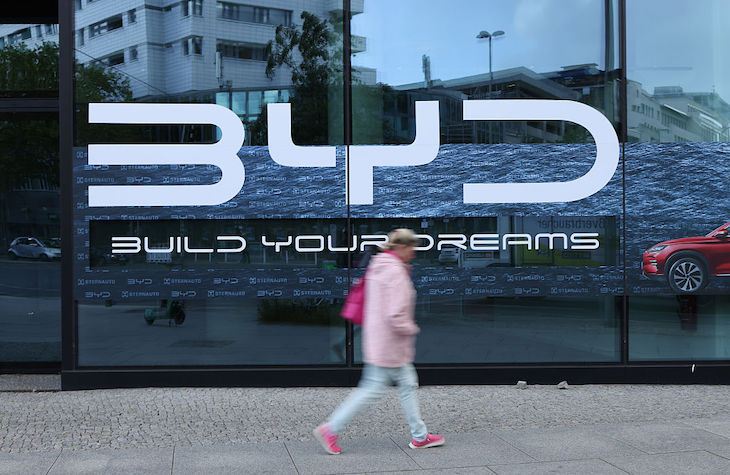From Thailand to Brazil, a surge of imports from Chinese electric vehicle (EV) producer BYD has the familiar pattern of being followed by the destruction of domestic automotive jobs. The UK is unlikely to be the exception. This week’s news that Britain has become the number one market for BYD should ring alarm bells. Our domestic automotive producers, that have already announced thousands of job losses this year, are unlikely to emerge unharmed.
BYD increased its sales in the UK by 880 per cent in September
For two years, analysts and policymakers have warned of the economic risk Chinese EVs pose to the legacy automotive industry through a new wave of deindustrialisation and job losses. These warnings have been heeded by governments in North America and in Europe which imposed tariffs to slow down the market share of Chinese producers like BYD. But the UK government has remained deaf to these warnings. Instead, it has sought to keep the UK market open to heavily state-subsidised Chinese EVs in the hope that they help the Britain meet its net-zero targets.
The automotive trade association the SMMT, which boasts Chinese state-owned UK legacy brand MG as one of its members, has shared in this conspicuous silence. It has kept schtum when it comes to calling on the Trade Remedies Authority to launch an anti-dumping investigation, which ministers claim they require to impose tariffs on Chinese EVs.
Instead of protecting the UK automotive sector, the government has sought unsuccessfully to court Chinese investment and encourage Chinese automakers to set up plants in the UK. Without an incentive to do so in the form of tariffs – and with the UK’s market too small to be profitable – Chinese EV producers continue to export from their base in China.
The result of this inertia has seen BYD increase its sales in the UK by 880 per cent in September by selling 11,271 EVs. These record sales have been helped by 100 new dealerships in the UK and an advertising blitz designed to undercut its domestic rivals who are unable to compete on cost, even with a new UK government EV subsidy.
In comparison, BYD’s domestic rivals have faced a myriad of problems this year from the automotive tariffs introduced by the Trump Administration, increased energy costs, increased national insurance contributions – and, in the case of Jaguar Land Rover, a cyber-attack that shut down production. The result has seen Nissan announce 250 job cuts, Jaguar Land Rover 500 job cuts, Aston Martin 170 job cuts, and Lotus 550 job cuts.
Surging BYD sales will only add to these woes. Chinese EV producers have a track record of flooding previously open automotive markets in Thailand, Turkey, and Brazil, with supply quickly outstripping demand. The domestic automotive industry then pays the price of increased Chinese market share with job losses and factory closures.
Take Thailand, where the previous government there offered Chinese EVs preferential treatment if they transferred technology. Rather than offer technology to domestic partners, Chinese EVs now boast 70 per cent share in Thailand’s EV market. Domestic production of vehicles recorded a 25 per cent year-on-year drop in January 2025.
Brazil, where BYD sales rose by 327 per cent from 2023-2024, has not fared much better. In May, BYD’s largest car carrier brought 7,300 new EVs to the Latin American country. The Chinese EV producer’s presence in Brazil has not been without controversy. In the same month that BYD’s car carrier arrived in the country, Brazilian prosecutors announced plans to sue BYD and two of its contractors for ‘slave like conditions’ at a factory site. BYD has previously said it has ‘zero tolerance for violations of human rights and labour laws.’
Seeking to shut the stable door after the horse has bolted, Turkey and Brazil have imposed tariffs on foreign EV imports and introduced other restrictions with limited effect in resurrecting their domestic automotive industries. The UK will soon face a similar choice between erecting tariffs and increasing taxpayer support to keep its domestic automotive sector afloat, or letting it wither further on the vine.
For a government that is seeking to fend off Reform in the former UK industrial heartlands, a wave of automotive job losses will do little to bolster its popularity. BYD’s dominance will lead to a further depletion of the UK’s manufacturing base. A manufacturing base, I might add, which was vital in the Covid-19 pandemic in helping produce ventilators, and an automotive base which is being used in Europe these days to help produce arms.
In short, whether it is on the grounds of economic security, national security, or domestic politics, the UK cannot afford to lose its automotive industrial base at the hands of Chinese EV producers.







Comments